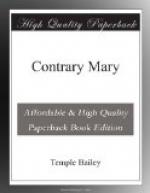Your decision that it was best to tell what there is to tell, to let nothing be hidden, is one which I should have made long ago. Only of late have I realized that concealment brings in its train a thousand horrors. One lives in fear, dreading that which must inevitably come. Yet I do not think I must be blamed too much. I was beaten and bruised by the knowledge of my overthrow. I only wanted to crawl into a hole and be forgotten.
Even now, I find myself unfolding slowly. I have lived so long in the dark, and the light seems to blind my eyes!
It is strange that I should have remembered Delilah Jeliffe, but not strange that she should have remembered me; for I stood alone in the pulpit, but she was one of a crowd. Since your letter, I have been thinking back, and I can see her as she sat reading in the front pew, big and rather fine with her black hair and her bold eyes. I think that perhaps the thing which made me remember her was the fleeting thought that her type stood usually for the material in woman, and I wondered if in her case outward appearances were as deceptive as they were in my wife—with her saint’s eyes, and her distorted moral vision. Perhaps I was intuitively right, and that beneath Delilah Jeliffe’s exterior there is a certain fineness, and that these funny fads of dress and decorations are merely in some way her striving toward the expression of her real self.
What you tell me of your talk with your cousin Grace interests me very much. I fancy she is more womanly than she is willing to admit. Yet she should marry. Every woman should marry, except you—who are going to be my friend! There peeps out my selfishness—but I shall let it stand.
No, I don’t like the idea that you must work. I don’t want you to try your wings. I want you to sit safe in your nest in the top of the Tower, and write letters to me!
Labor, office drudgery, are things which sap the color from a woman’s cheeks, and strength from her body. She grows into a machine, and you are a bird, to fly and light on the nearest branch and sing!
But now you will want to know something of my life, and of the house and of Cousin Patty.
The house has suffered from the years of poverty since the War. Yet it has still about it something of the dignity of an ancient ruin. It is a big frame structure with the Colonial pillars which belong to the period of its building. Many of the rooms are closed. My own suite is on the second floor—Cousin Patty’s opposite, and adjoining her rooms those of an old aunt who is a pensioner.
There is little of the old mahogany which once made the rooms stately, and little of the old silver to grace the table. Cousin Patty’s poverty is combined, happily, with common sense. She has known the full value of her antiques, and has preferred good food to family traditions. Yet there are the old portraits and in her living-room a few choice pieces. Here we have an open fire, and here we sit o’ nights.




